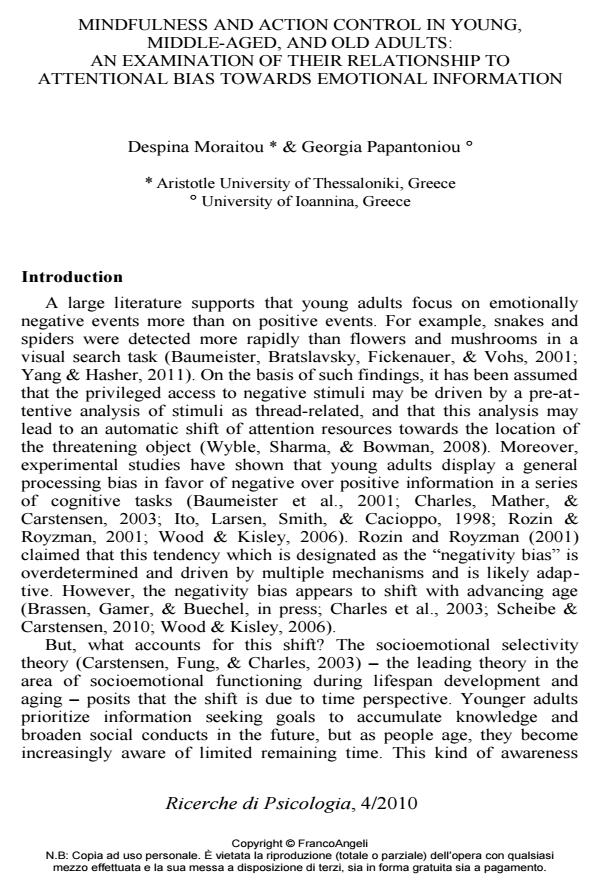Mindfulness and action control in young, middle-aged, and old adults: an examination of their relationship to attentional bias towards emotional information
Journal title RICERCHE DI PSICOLOGIA
Author/s Despina Moraitou, Georgia Papantoniou
Publishing Year 2012 Issue 2010/4
Language Italian Pages 36 P. 591-626 File size 1043 KB
DOI 10.3280/RIP2010-004007
DOI is like a bar code for intellectual property: to have more infomation
click here
Below, you can see the article first page
If you want to buy this article in PDF format, you can do it, following the instructions to buy download credits

FrancoAngeli is member of Publishers International Linking Association, Inc (PILA), a not-for-profit association which run the CrossRef service enabling links to and from online scholarly content.
The aim of the study was to investigate the relationships of the self-regulatory dispositions of mindfulness and action control with attentional bias towards emotional information in young, middle-aged, and old adults. The participants (N = 185) were 69 young adults (M = 24.7 years; SD = 5.0), 67 middle-aged adults (M = 47.3 years; SD = 7.6), and 49 old adults (M = 73.4 years; SD = 5.6) of both genders. They were divided into three educational levels (low, middle, high) according to the years of education. An emotional color-word interference test (EC-WIT) was designed by the authors to investigate attentional bias towards (a) positively toned and (b) negatively toned information, and it was used along with self-report measures of dispositional mindfulness and action-state orientation. The results indicated that age was related to slower reaction times (RTs) for the two conditions of the EC-WIT, while the higher the level of education the faster the RTs. Decision-related action orientation was associated with a decreasing level of negativity bias in early attention orienting only in young adults. Mindfulness was associated with a decreasing level of attentional bias towards emotional information, either positive or negative, only in middle-aged adults.
- Emotion Recognition in a Health Continuum: Comparison of Healthy Adults of Advancing Age, Community Dwelling Adults Bearing Vascular Risk Factors and People Diagnosed with Mild Cognitive Impairment Glykeria Tsentidou, Despina Moraitou, Magdalini Tsolaki, in International Journal of Environmental Research and Public Health /2022 pp.13366
DOI: 10.3390/ijerph192013366
Despina Moraitou, Georgia Papantoniou, Mindfulness and action control in young, middle-aged, and old adults: an examination of their relationship to attentional bias towards emotional information in "RICERCHE DI PSICOLOGIA " 4/2010, pp 591-626, DOI: 10.3280/RIP2010-004007